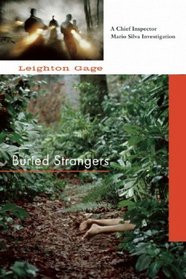First Line: "Somewhere around here," Hans said, swinging his flashlight beam from the dark tunnel in front of them toward the thick wall of vegetation on the right.
When Herbert the Escape Artist (AKA an Old English Sheepdog) proudly brings back a human bone and waits for praise, the police are called instead. There, in a rain forest twenty kilometers from São Paulo, police find a clandestine cemetery. And another. The corpses of hundreds of human beings-- often interred in family groups-- have been secretly buried.
This is a case that Chief Inspector Mario Silva can become very passionate about, since he lost his only child to leukemia when his son was eight years old. But there's a problem named Nelson Sampaio who just so happens to be Silva's boss. Sampaio is one of those political appointees with his eye on promotion, and he is absolutely convinced that another politico is sabotaging him. To Sampaio, nothing is more important than Silva digging up the dirt on his nemesis. Does this bother Silva? No. One of the delights of this series has turned out to be watching the machinations of Silva as he circumvents the human obstacles in his way in order to do what must be done.
Although the first book in the series, the excellent Blood of the Wicked was a bit heavy-handed with torture, this second book deals more with the interactions between the characters and is laced with humor. As Silva and his team slowly piece together tiny clues, the reason for the mass graves becomes horrifyingly clear.The extra dashes of humor were welcome intervals between corrupt cops and politicians and secret cemeteries.
With just two books, this series has become one of my favorites because of the strength of its characters, its strong sense of place, its powerful plots... and its ability, not only to educate me about an unfamiliar part of the world, but to leave me with a sense of outrage over injustice. What am I outraged over? I don't want to say very much because I don't believe in spoiling the plot for people who haven't read the book. I'll just say that cattle in Brazil have more documentation than many of its two-legged citizens.
Entertaining, educational, emotional. Haven't read a book written by Leighton Gage?
Why?
When Herbert the Escape Artist (AKA an Old English Sheepdog) proudly brings back a human bone and waits for praise, the police are called instead. There, in a rain forest twenty kilometers from São Paulo, police find a clandestine cemetery. And another. The corpses of hundreds of human beings-- often interred in family groups-- have been secretly buried.
This is a case that Chief Inspector Mario Silva can become very passionate about, since he lost his only child to leukemia when his son was eight years old. But there's a problem named Nelson Sampaio who just so happens to be Silva's boss. Sampaio is one of those political appointees with his eye on promotion, and he is absolutely convinced that another politico is sabotaging him. To Sampaio, nothing is more important than Silva digging up the dirt on his nemesis. Does this bother Silva? No. One of the delights of this series has turned out to be watching the machinations of Silva as he circumvents the human obstacles in his way in order to do what must be done.
Although the first book in the series, the excellent Blood of the Wicked was a bit heavy-handed with torture, this second book deals more with the interactions between the characters and is laced with humor. As Silva and his team slowly piece together tiny clues, the reason for the mass graves becomes horrifyingly clear.The extra dashes of humor were welcome intervals between corrupt cops and politicians and secret cemeteries.
With just two books, this series has become one of my favorites because of the strength of its characters, its strong sense of place, its powerful plots... and its ability, not only to educate me about an unfamiliar part of the world, but to leave me with a sense of outrage over injustice. What am I outraged over? I don't want to say very much because I don't believe in spoiling the plot for people who haven't read the book. I'll just say that cattle in Brazil have more documentation than many of its two-legged citizens.
Entertaining, educational, emotional. Haven't read a book written by Leighton Gage?
Why?




